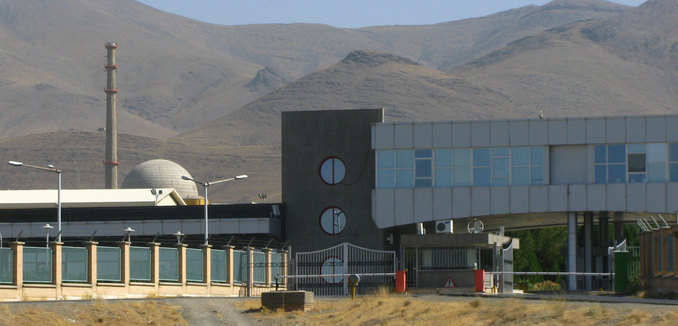The recent boasts by Iran’s atomic energy chief mean that the International Atomic Energy Agency (IAEA) must ascertain that the Islamic Republic does not have a secret “plutonium pathway to nuclear weapons,” a paper published Tuesday by the Institute for Science and International Security asserted.
In widely publicized remarks, Ali Akbar Salehi, the head of the Atomic Energy Organization of Iran (AEOI), boasted that Iran had surreptitiously acquired pipes that could be used for making a calandria for its heavy water reactor in Arak. A calandria is a receptacle for nuclear fuel and, by the terms of the 2015 nuclear deal, Iran was supposed to have filled its pipes with concrete, rendering it inoperable. Salehi’s boast raises the possibility that Iran possesses the resources to make a new calandria, which would violate the terms of the deal and allow it to resume its production of plutonium.
The paper, written by David Albright, the institute’s president, and Andrea Stricker, a senior policy analyst there, recounted:
Salehi stated, “There are tubes where the fuel goes [in the calandria]. We had bought similar tubes, but I could not declare this at the time. Only one person in Iran knew this. We told no one but the top man of the regime [Khamenei].” He continued, “We had bought the same quantity of similar tubes. When they told us to pour cement into the tubes… we said: ‘Fine. We will pour.’ But we did not tell them that we had other tubes. Otherwise, they would have told us to pour cement into those tubes as well. Now we have the same tubes.”
Salehi’s comment, they write, “raises the question of whether Iran has built, or could quickly build, a duplicate calandria for the Arak reactor or another one that has not been declared by Iran.”
The IAEA, according to Albright and Stricker, must ascertain if Iran did indeed illicitly acquire these pipes and from whom. The nuclear watchdog must also determine whether Iran intends to build a new calandria. If such pipes do exist, the IAEA must ensure that they are rendered inoperable.
An additional problem with Salehi’s boast is that “Iran was subject to prohibitions on its import of nuclear-related goods.”
“It is worth noting the deceptive nature of Iran’s stated efforts to circumvent the JCPOA restrictions in advance and Salehi’s bold announcement of that fact,” Albright and Stricker write. “The international community should question whether Iran truly intends to renounce nuclear weapons development, as it pledged under the JCPOA, both in light of such statements, and due to information from Iran’s Nuclear Archive about its efforts to hide military-related nuclear efforts after 2003.”
In light of Salehi’s claims, the IAEA has an obligation to ascertain that Iran is keeping to its Nuclear Non-Proliferation Treaty commitments and, further, “to investigate the potential violation or inconsistency of any JCPOA limitations.”
[Photo: Nanking2012 / WikiCommons ]




